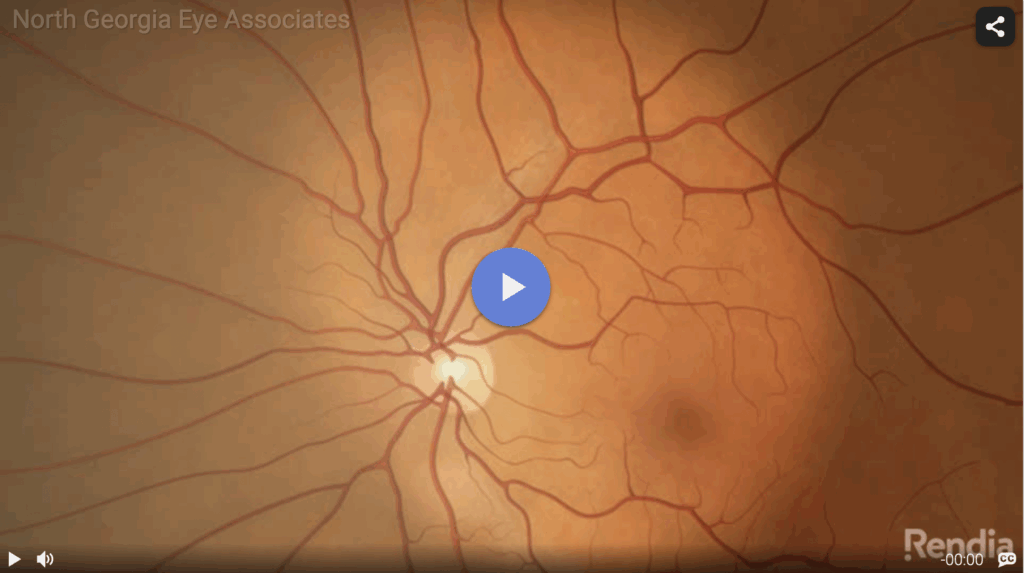Retina

What is the Retina?
The retina has a vital role in how your vision works and operates. At North Georgia Eye Associates, our retina specialists have the experience and knowledge to diagnose and treat retinal conditions to ensure that you continue to experience clear vision.
The retina is a layer of tissue located at the back of the eye that significantly impacts and affects your ability to see. It’s responsible for capturing light and converting it into signals transmitted to the brain, allowing you to see.
The retina contains specialized cells responsible for detecting light and starting the vision process. The retina acts as the visual system’s initial light-capturing and information-processing layer, paving the way for the brain to create the images you see.
As essential as the retina is for vision, many issues can arise within this structure inside the eye. If there are problems with the retina, this can cause reduced or distorted vision. To best protect your vision, visiting your eye doctor for eye exams is necessary.
During a routine eye exam, your eye doctor at North Georgia Eye Associates can detect any changes early to help preserve your vision. If you have already been diagnosed with a retinal condition, it’s imperative to see your eye doctor regularly to ensure you aren’t at risk for vision loss.
What Are the Most Common Symptoms of a Retinal Condition?
The symptoms of a retinal condition can vary depending on the specific condition and its severity. However, there are several common symptoms that you might experience if you have a retinal issue.
Some of the most common symptoms of a retinal condition include:
Blurry or Distorted Vision
Blurriness in central or peripheral vision can be a sign of retinal problems. Straight lines might appear wavy or distorted.
Floaters
Floaters are tiny specks or spots that seem to drift across your field of vision. They may appear as dark dots or lines and can be more noticeable when looking at a bright background.
Flashes of Light
Some people with retinal issues report seeing flashes of light, similar to seeing lightning or a camera flash.
Sudden Onset of Vision Loss
A sudden and noticeable decrease in vision, either partially or completely, can indicate a serious retinal problem, such as a retinal detachment.
Dark or Empty Areas in Vision
A dark or empty area in your visual field, often described as a curtain or shadow, can be a sign of retinal detachment or other issues affecting peripheral vision.
Color Perception Changes
Difficulty distinguishing between certain colors or experiencing color distortion might be linked to specific retinal conditions.
It’s important to note that these symptoms can also be related to other eye or health issues, so it’s crucial if you are experiencing these symptoms not to assume you have a retinal condition. If you experience any sudden or persistent changes in your vision or notice any of these symptoms, schedule an appointment with your eye doctor at North Georgia Eye Associates right away.
What Common Eye Conditions Affect the Retina?
Several common eye conditions can affect the retina, potentially leading to vision loss or even blindness if left untreated. At North Georgia Eye Associates, we are dedicated to providing comprehensive retinal care and treatment for these conditions.
What is Macular Degeneration?
Macular degeneration, also known as age-related macular degeneration, is a progressive eye condition that primarily affects the macula, the central part of the retina responsible for sharp and detailed vision. As the condition progresses, it can lead to central vision loss, making activities like reading, recognizing faces, and driving difficult.
What is Diabetic Retinopathy?
Diabetic retinopathy is a complication of diabetes that affects the blood vessels in the retina. High blood sugar levels can damage these blood vessels, leading to leakage, swelling, and even abnormal growth.
In its early stages, diabetic retinopathy may not cause noticeable symptoms. However, as the condition progresses, it can result in blurred vision, floaters, and even complete vision loss.
Early detection and management are key to preserving vision and quality of life. Our team at North Georgia Eye Associates offers advanced diagnostics and personalized treatment options to address these retinal conditions and many others.
Can Retinal Conditions Be Treated?
Many retinal conditions, including macular degeneration and diabetic retinopathy, can be treated, managed, or slowed down with the right interventions. Early diagnosis is crucial for effective treatment outcomes.
Our skilled retinal team at North Georgia Eye Associates utilizes state-of-the-art diagnostic tools such as optical coherence tomography (OCT) and advanced treatment options, including intravitreal injections, laser therapy, and surgical procedures to address retinal conditions. Our personalized approach ensures that each patient receives tailored treatment plans that align with their specific needs and condition severity.
If you are experiencing symptoms like blurry vision, distortion, or changes in your central or peripheral vision, it’s important to schedule an appointment with North Georgia Eye Associates. Our retinal specialists are committed to preserving your vision and enhancing your overall eye health.







